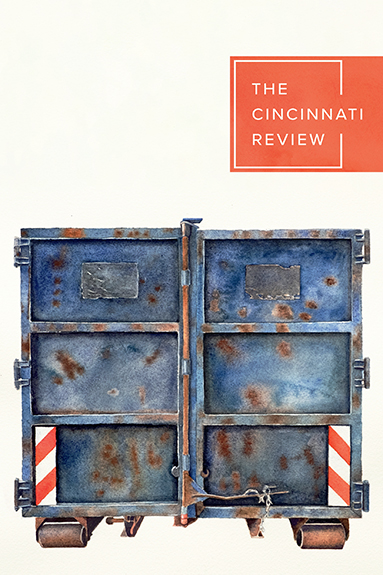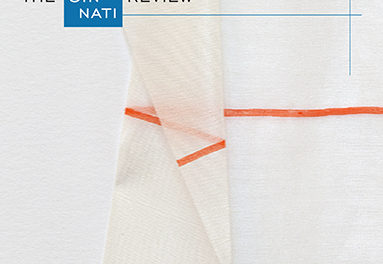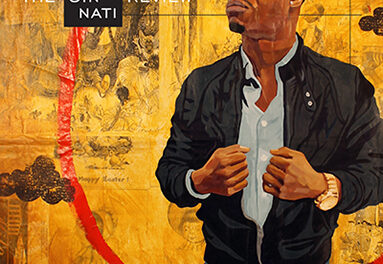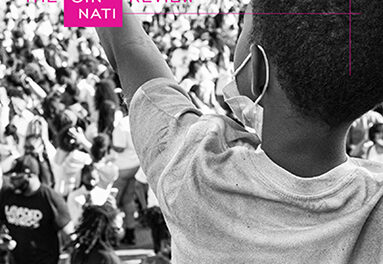Winner of the 2024 Robert and Adele Schiff Award in fiction
At night I kept my Jesus folded small in the corner of my closet, arms under tucked knees, dark mangled locks beneath the cotton dangle of buttoned shirts I didn’t wear. That’s where I charged him too. Anywhere out in my room would have felt strange, like he might wobble onto my bed as if it were a rowboat and preach above the steady evening chirr, despite the man at the shop saying my Jesus couldn’t do that. He wasn’t top-of-the-line.
The man at the shop had said that in addition to this unit having a bum battery—wouldn’t last more than a day—it couldn’t speak. I didn’t mind. I didn’t need one to scold me into confessions or to teach me Bible verses. I wanted one to show other kids that I had a Jesus too. I wanted someone to walk with, someone to hold my hand when I got sad. So calloused and knotty my Jesus’s palms were, worn like the wood balls on banisters in old houses. That used leathery feel was probably from his design as a carpenter and all, but I liked to think he came pre-owned from a long line of boys and girls as lonesome as I was.
The usual morning routine: Wash my face, brush my teeth, get dressed. Wipe with a damp cloth Jesus’s charging port at the top of his spine (chalky impurities would crust overnight, a problem the manufacturer said was due to the leaky vascular system in older models). Dress Jesus in basketball shorts and a T-shirt. Make a bowl of cereal. Take my acrothioprine. Let Jesus out into the backyard for the day to sit among the daisies. Catch the bus for school.
It only seemed right, that one Sunday, to dress Jesus first. I couldn’t afford the Authentic Galilean TunicTM, so the closest I could get was to pull Amazon Basics long pajamas up his legs. I drew his arms through the sleeves of a beige polyester bathrobe from Target. With Jesus ready and waiting by the bedroom door, I slid off a hanger the periwinkle shirt Mom used to make me wear at Easter. Before the last few buttons, I paused. I ran a finger over the marbled gash down my sternum, the meaty pink ridges the surgeon had said were a sign of how tough I was; he said it, however, self-impressed, like he was the tough one. My other doctor did this too. She said to consider my immunosuppressants “antirejections,” like she could rebrand my body’s commitment to self-destruction. Their bedside manner, all their attempted words of comfort were airy, their many prior rehearsals of human care lead-lined. I lifted my hand from my scar and caught Jesus’s wooden stare. Time to go. I looped over my head the paisley-yellow necktie with the knot Mom made for me before she passed.
The two of us sneaked quietly out the front door. I didn’t want to wake Uncle Bo (if he was even home; he might have gotten stuck at the office again last night) or Aunt Tammy (if she wasn’t distracted about where Uncle Bo really was, she was probably too hungover anyway). So the day I’d decided to go back to church, it was Jesus who walked me there.
* * *
The company behind Your Own Personal JesusTM branded it as the most faith-based, groundbreaking technology there ever was. The skin and tissue, synthesized from genomes sequenced from first-century Jews who had lived in Palestine; the skeletal structure, a composite of as many “originally sourced” bones as possible. (How they got them, no one asked.) The latest models featured the most sophisticated artificial intelligence and robotics. Every wave of the hand, every step in those Authentic Galilean SandalsTM, moved, according to kinesiological historical reconstructions, as accurately as possible. The operating system’s language-learning model preloaded texts from every theologian, philosopher, historian, and academic who’d ever written about Jesus, perfectly calibrated to achieve the personality, demeanor, and speech of the truest Christ. Then, before each unit left its factory line in Shenzhen, before it was boxed in a crate and a shipping label slapped on it by a steel roller, no fewer than three ordained clergy (a rabbi, a priest, and a minister) would pray over it. The tagline: “A Jesus in Every Home” or “What Would Jesus Do? He Can Tell You!” or, on Black Friday and Holy Week, “Save Big on the Savior!” More Jesus in more homes could save the world, preached this darling of venture capital at the company’s IPO.
While the latest models with premium subscriptions sold for up to $1 million (plus tax and shipping, of course), everybody who was anybody had something. At least a halfway decent unit that could last a week on full charge and mow a lawn. My model was so old that in addition to not having a solid battery and not being good for any chores, he looked aged. He had wrinkles in his face. Grays in his flowing hair. I let him hold my phone once, and he typed on it with his index finger.
* * *
Except for the heel-to-asphalt slap, slap, slap of Jesus’s black rubber CVS sandals on the road, the way to the church was slow and quiet. Trees and lawns and cars in driveways had a way of decluttering sound; where Uncle Bo and Aunt Tammy lived, quiet distances meant no disturbances which meant protection which meant comfort. But the more space you had, the more stuff you’d need to fill it, the more space and quiet you’d need to protect the stuff and so on. The worst thing to happen to this town was when its dog park was infiltrated by people from the next town over bringing their much-noisier, less-behaved dogs. When Mom was around, we lived in the city, and she would say no place on its own could make you really feel safe. People made people feel safe. She hated when Uncle Bo made Aunt Tammy move farther out because of the “crime.”
Walking this far next to Jesus through a neighborhood I didn’t know meant a lot of awkward silence. After a few weeks, I still didn’t know if I was supposed to get to know him, or he me. He hadn’t asked about my nickname yet or if my Bible had been collecting dust and shadow somewhere in my room. (It had.) To be fair, I hadn’t gotten to know him either. I’d felt bad he was by himself every day while I was at school, and assumed he’d fit right in at a church. In our small yard, one could consider only so many flowers, so many birds. Maybe at a church he could meet other Jesuses and make friends, but I never knew what he was thinking.
His hyperrealistic design, the knowing look on his face, was supposed to make me pre-feel his omniscience. Some critiqued these earlier models’ measly number of facial expressions (180) as subject to cultural and conditioned interpretations of body language: often Western, white, male. The later models had thousands of scientifically validated expressions to convey Jesus’s all-encompassing knowledge. None of that would have mattered for me. I didn’t know what omniscience was supposed to look like. Whenever I talked, my Jesus listened as if everything I said was news to him. I could tell not by his face but by his shoulders. Not because they made him appear strong and deity-like. Something about his lumpy and twiggy posture made him feel approachable and trustworthy. Super crucifiable. I asked him if he felt going to church was like going home. He didn’t say anything. A curious face was all he gave, same one as that time I asked if he wanted to taste a Cheesy Gordita Crunch.
As the road inclined, the canopy shade spilling over more pavement, Jesus started to limp, like his hip was getting sore, like he, too, had this little thorn to remind him he wasn’t long for this world. I smiled and patted his back.
Slap-slap, slap. Slap-slap, slap.
* * *
My Jesus came from a certified refurbisher and reseller, a man who was old yet willowy, with a face like a dried fig. When he saw my analog backpack and me dumping out of it all the paper money I’d earned from Aunt Tammy doing extra chores, the man felt sorry for me. He said he’d take whatever I had and went through a creaky door in the back. It felt like hours, my lingering in this hobby shop, its shelves scattered with antique iPhones and vintage VR headsets and other unintelligent hardware. I pictured him going to a warehouse where, from a stack of leftover Christs piled on top of each other, he dragged mine out by a limp, flaky forearm. (Older Jesuses needed routine lotioning.)
Before he powered the machine on for me in the middle of his shop, the man tried to warn me: this unit might not last much longer. They didn’t make parts for this model anymore, and it could malfunction anytime. He recommended I save up for a newer one, they’re really something, and these older ones, nothing good comes from them anymore. I shrugged. It looked good enough to me. So I left all I had and came away from that shop with a cheap, refurbished Messiah.
When I brought him home that first day and introduced him to Aunt Tammy (Uncle Bo away again on work travel), she didn’t shake his extended hand or say hi. “We’re familiar,” Aunt Tammy said. Mom’s rapid decline and our family’s unanswered prayers winnowed whatever faith Aunt Tammy’d had to a pea-size pity, enough to allow me whatever I needed to grieve—however religious, expensive, or deranged. Her requirements were that Jesus only play outside, not in shared spaces in the house, and that I was not to bring him to school. So those first few weeks together, we had done a lot of walking. I showed him around town like he was the new kid, brought him where I spent most of my free time. This was the park. This was the library. This was the combo KFC–Taco Bell–Long John Silver’s.
* * *
Birds sang unseen from the suburban cypresses and cedars. Magnolia branches and blossoms rattled under the hasty skate of fatter squirrels. But while Mom and I used to walk all the time in the city, here there were no sidewalks. Aunt Tammy warned me that people drove everywhere, but I didn’t realize how far this church truly was when she said I shouldn’t go all that way alone. I needed several breaks, especially while we hoofed up the hill. Resting on a spaghetti bowl of big brown tree roots, I leaned up against the trunk, sat in one of the knotty nooks, and heaved deep breaths. While getting tired was normal before, it happened more often after my procedure.
Congenital myocarditis occurred in very few people, and cases that required heart transplants were even fewer. But eligible human hearts fetched a premium price, one too rich for Uncle Bo, and my late mother’s lymphoma hadn’t helped my cause on the transplant list. Plus, Uncle Bo said his insurance would cover the surgery and post-op only for natural non-primate xenotransplants. He said it was the bare-minimum legal requirement for coverage. Plus, post-op was cheaper with them. Insurers didn’t think patients would last on the relatively new procedure. In the unlikely event that a non-gene-edited porcine heart did take, an infection would surely do me in. Still, after half a year, I lived—I washed my hands thoroughly after I did anything, ate only well-done burgers, and avoided all crowds. Masked indoors at all times with strangers. No sports, only moderate walking. But I was alive.
As I rested under the tree, Jesus didn’t do much. Every now and then, he would jerk toward a squirrel or sparrow in a movement that wasn’t entirely natural, hardly supernatural. He seemed fascinated by this creation he was supposed to have been involved in making. (Surely as an adviser at least.) He favored one leg as he stood unevenly over the squirmy roots, and nearly fell several times, none of which felt especially divine. I didn’t know what certified Jesuses as real, didn’t know enough Bible to know if he was biblical. I couldn’t tell the difference between knockoff Jesuses and old Jesuses—they were just more man-made machines branded as saviors. But who was I to judge? I didn’t even know what made someone a whole person or how much pig would make them a Pigboy. With his bioelectric residues and degraded battery and my surgeries and dead mom, I imagined us the same—two defective versions of whatever we were.
He started pacing in the road (I don’t know where he learned that maneuver), as if impatient with my rest. On our last few walks together, when Mom could barely hold herself up, she would still check to see if I was okay, if I needed a snack, and would offer me one of the granola bars she always carried, but I’d decline because they were oaty and gross.
She wasn’t a doctor but she became an expert in my care. Then, when her own diagnosis arrived, it felt like her saying she was sick of doing that for so long, sick of protecting her sick boy anymore. She wouldn’t ever say it, but my living had worn her out.
When he saw me struggle to stand, Jesus reached down to help me up. We started walking again along the road, beside the trimmed grasses and manicured hydrangeas. The houses seemed to get larger, the driveways wider, the security cameras over the front doors glassier.
Mom used to say that people were scared silly of losing their treasures and that some in church circles who used words like protection or stewarding were citing scripture to paper over their fears—a bold thing for a dying woman to say. Soon after she’d gone was when doctors said I needed a new heart, and wanting protection didn’t feel silly then. To want solid asphalt beneath my heels, the quiet crisp of rust-red autumn leaves under my toes. For someone to slap-slap, slap beside me.
Suddenly—a tap on my shoulder. Jesus pointed ahead and I nodded. There atop the hill we’d been climbing rose a tall steeple. He looked up at it, a wonder in his foggy eyes, his bathrobe flapping in the wind a little too immodestly for church.
* * *
The first Jesus I met in person belonged to Jimmy Belkin, a cool kid with purposely mussed hair and fake gauge earrings who went to my new school. Jimmy brought his Jesus every day. The kids who did—there were a bunch—had their parents file claims with the administration that the Jesuses were either a free expression of religion or their service animals. It made for an eerie sight, these tall, bearded humanoids walking among middle schoolers. They greeted kids kindly, but, like a glitch, they would ignore each other, as if the others didn’t exist. I suppose it wouldn’t make sense for there to be multiple Messiahs. How often could a universe need saving?
Jimmy’s Jesus was brawny because, I later learned, he brought his Jesus with him to the gym. Some people hung out with their Jesus like a friend, others had their Jesus pick them up from school or drive them to practice. Others were field-trip chaperones. Brawny Jesus felt more like Jimmy’s personal bodyguard. Rumor was, under that Premium Royal Silk TunicTM, Brawny Jesus was safety-equipped. By Jimmy’s rationale, you never knew when and who might “go crazy” and you had to be prepared. According to rumors, he even trained Brawny Jesus at a self-defense practice site, facilities that Mom and Aunt Tammy had insisted we still call shooting ranges.
My first week at the school, as I fumbled around with my books, I bumped into the back of Brawny Jesus in the hallway. I looked up at his secret-agent sunglasses and crew cut and apologized, thinking it was a dad. Then, when he smiled and presented a bulby muscled hand to shake and said, “Hi, I’m Jesus,” I laughed out loud.
“Hey,” Jimmy said around the other side. “Watch yourself.” He patted a hard surface on Jesus’s side beneath his arm with a gesture that threatened self-defense. “At least I’ve got one. I don’t see yours anywhere.” He two-hand-shoved me in the chest, and I could hear other kids around us ooh, like there was going to be a fight instead of me falling on my butt to the mosaic-tiled floor. My heart throbbed as I clutched my shirt. He looked at me, confused. “Are you that kid with the transplant? The Pigboy? Gross.” He wiped his hands on his pants and made a few oinking sounds, which the crowd around us laughed at before a teacher broke it all up. It was the first time I’d heard it. After that, it was all I heard. I was him. The one with the pig heart. No longer just a boy.
* * *
Slowing cars creaked as the trees and houses gave way to a parking lot like a tar collar around the main building. Above the white-bricked, black-metal-trimmed, heavily windowed structure towered an imposing steeple. It reminded me little of my Mom’s church where she was a deacon, which rented out the gymnasium of a local community college downtown, where Sunday suppers were potlucks, not catered, where people wore jeans and sometimes had ketchup spilled on their hoodies.
As we neared, my chest cranked but not from the tiredness. My lungs and organs felt crumpled like used tissue paper. Jesus slowed alongside me. I couldn’t breathe, the panic excruciating. A large bush of gardenias rustled in the wind near the granite sign of the church, where, between the shrub and the stone, there was a hidden space. When none of the people in their fancy suits and nice shoes, beaming whole families with children running ahead in dresses and dress pants, were looking, Jesus pulled me into that hollow. As I hyperventilated, he bent over me like he was shielding me from something falling, though nothing was overhead. He didn’t know what was happening—I didn’t connect him to Wi-Fi or subscribe to the weekly software patches, so I don’t think he knew about dyspnea or anxiety or crappy HMOs—but he crouched there with me until I could breathe again.
After I’d rebuttoned my shirt and retightened my paisley-yellow tie, I checked on Jesus too. Watery discharge fell from his eyes. The man at the shop had said this would happen from time to time: degrading microfibers in the ophthalmic vasculature made this model prone to leaks of synthetic intracranial plasma. I reached to dab his upper cheek with the last of a pack of Cybernetic Tissue WipesTM and retied his bathrobe. “I’ll be okay,” I reassured him.
The bell clanged above to signal the start of service. Two suited and name-tagged ushers at the front doors wore a welcome in their staged smiles, although as we took their bulletins and walked on by, I heard the younger of the two snicker.
In the sanctuary, you could see everyone’s Jesus. Their shampooed and combed auburn hair bobbed above the congregation like cattails in beach grass. All in their Sunday best. Some had opted for the premium Authentic Canaan Wedding TunicTM, while others went for a plain black or navy-blue Valentino wool suit. They donned identical coy smirks. My Jesus, meanwhile, had resting b–– face and an unwashed bathrobe. Plus, he had wrinkles and a slight runny nose and I’d run out of Wipes.
As we sat down in a packed pew, the only seats available, I noticed someone behind me. It was Jimmy Belkin. His earrings were out, though, his hair carefully combed. A smart navy-blue tie. I was afraid he’d hassle me somehow, about how ratty my Jesus looked in his long johns and bathrobe. I was afraid he’d make comments about how I wasn’t clean (the pig heart). But he didn’t. He left me alone. In fact, before I’d gotten settled, I had seen that his head looked straight and disciplined next to a gargoyle of a man who must have been his father, severity etched in that man’s face because church was a serious matter. And on Jimmy’s other side: Brawny Jesus. Thankfully, they all ignored me, like I didn’t exist. So I watched the congregation sing listless hymns in peace. I watched a stodgy man read scripture, a pastor sermonize. These were really hard to stay awake for, so instead I closed my eyes like fake prayer would be my worship.
But if Mom was right that worship wasn’t about being in a building and was, instead, some kind of communion with a divine Presence, and if that Presence really lived in human beings, and if being human meant seeing beyond organs and cells and genes and neoplasms, then I’d already known how to worship, had been worshipping. In that drifty space between boredom and getting sleepy, I could smell the chrysanthemum in my mother’s tea, hear the hum of her alto on “How Firm a Foundation,” feel the brush of her thumb looping the tie around my neck—all the last sacred living we did together.
“Everyone needs help,” Mom had said from her hospital bed, her voice a frayed thread of what it once was. “Everyone’s got an illness or three. Some people have bone cancer, others have money cancer. Some people need heart surgery, others need soul surgery. That’s God’s doing, making all of us need some healing. It’s how we get to love and care for each other. You might not feel well, but you aren’t broken, baby, no one is broken, and don’t let anyone put that on you. Leprosy didn’t make lepers, people did.” The jade in her irises had begun to blanch. “Jesus didn’t come for the healthy, he came for us. The way I’ll always come for you.”
I remember the pain in my chest then as she, frail and fading, clutched my hand as tight as she could, which was not very much, like she was transfusing whatever little spirit she had left, like she could still help save me. My body shuddered as it lulled deeper and deeper, the echo of church music fading until my mother’s words drifted above it. They whisked, as if on a wind so strong their slipstream carried God—through those of us without complete parts, the rejected units, the forgotten models stacked in a closet, the ones who needed to be plugged in and pilled. And for the first time, I felt the Lord of broken bodies.
* * *
That’s when my Jesus finally woke.
A dizzying electric whir engulfed the sanctuary, above the choir and the operatic strings, a mix between an ambulance and a lawnmower. People screamed. My Jesus’s eyes lit red, steam rising from his dome. His mouth coughed sparks like an arcing car battery. Patches of velvet pew backs caught on fire. Congregants around us shuffled away, but not before my Jesus spun wildly at his hip and thwacked Brawny Jesus behind him. Brawny Jesus, thick as an ox from muscle and three times the weight of a regular person, fell on top of Jimmy’s dad, whose head cracked against the pew bench. After Brawny Jesus climbed off while Jimmy gawked at his dad’s dazed head, Brawny Jesus knelt beside them, surely to offer his thoughts and prayers. There were no First-Aid software add-ons yet. Personal Jesuses couldn’t heal.
Ashamed, I bear-hugged my unit and pushed him out of the pew, my chest to his back. The overheat of his dense frame radiated through the faux-keloid crucifixion scars (which were really fiber-optic cables) onto my own filleted chest. Adrenaline-flooded, I shuffled my feet and shoved at his hips while he continued to malfunction, sulfurous wisps of singed hair wafting all around. I dragged him by the hand into the aisle, out past the human faces mortified that their worship had been disrupted, past Jesuses in suits—some of whom held out their hands as if to heal us, others muttering as if in prayer—and into the lobby, beyond holograms hawking ministry merchandise and self-serve kiosks selling faith-based mutual funds, through the sun-veneered vestibule and past puzzled looks of the ushers, and out to the sidewalk. I peeled off my mask, ripped off my yellow tie, flung them to the ground, and sped home too fast for my body and my Jesus, whose feet scampered to keep up behind me.
Jesus spent the rest of the day, afternoon, and evening crumpled in his closet corner like dirty laundry. He’d stopped going haywire, but I hadn’t bothered to connect his charger when I stuffed him in along with my church clothes. There was some faint and periodic rustling and scratching on the walls like Jesus wanted out even though he didn’t need oxygen to breathe. He was just a robot. Maybe he was reminding me he needed to be charged, like I would have forgotten.
Aunt Tammy let me have dinner in my room, a few slices of pizza and a soda, which I had in bed looking at an old photo. Mom held me after my baptism, a huge smile slung on her face, me wailing. “I can’t believe you,” I whispered. “I can’t believe you.” I could hear Aunt Tammy on the phone downstairs, apologizing to Jimmy’s mom. No more immunosuppressants from now on, I decided. They hadn’t been good for antirejecting at all. I was done. Everyone lied.
My dream that night: Jesus wobbled over me in the blackness, a dirty foot on each side. I tried to scream, but I was paralyzed, like my body was lashed to a massive rock. Jesus bent down at his hip, like he was stretching, and placed a heavy hand over my chest, over my scar, and all I heard him say was “Hole.” He got down from the bed, walked away, and I fell back asleep.
By the time I woke up, something convinced me my dream was really a miracle. I’d open my pajamas and look at my chest, my scars would be gone, my pig heart magically removed and replaced with a real person’s heart. It’d be real, the thing we’d been praying for. That’s what it was all about. The reason everything happens for. Yet when I looked under my shirt, there my gash still was. There were no miracles in an artificial world.
I opened my closet to plug Jesus back in—I felt bad leaving him uncharged—but he wasn’t there. Aunt Tammy said she hadn’t seen him around the house or backyard. I put up paper “Lost” signs around the neighborhood. I scoured the internet and set alerts for news of lost Jesuses wandering about and for drifters in bathrobes causing disruptions. I went back to the man at the shop to see if anyone had turned in my old model for parts, and he said no. I reached out to the company. I called a few organizations that advocated for the liberation of synthetic Jesuses. No one anywhere reported sightings of an unclaimed Jesus that fit my description.
He was gone.
And surely I wouldn’t be far behind.
* * *
Years later, with Uncle Bo long gone from the picture, when I moved Aunt Tammy out of that house and into an automated-care resort (Aunt Tammy said to still call it a “nursing home”), she said I could have whatever I wanted from the house. There were a few valuable pieces of furniture and some collectibles from before the divorce she said might be worth some money. So while my five-year-old played with a heap of first- to fourth-Gen iPhones in the living room, I went to my old bedroom. I opened my closet door, slow and uncertain, the way you weren’t supposed to peel bandages.
I brushed back some of the old dresses and coats Aunt Tammy had hung in the closet after I graduated from college, and sat down in the spot where I used to charge him. Into that tiny corner curled my now-grown body, while I let those fabrics brush my hair. I crouched and closed my eyes. Memory gathered me there as I put a hand on my own chest and felt the strength of my heartbeat. Thud-thud, thud-thud. When people leave, who knows if their survivors heal, or if it’s that life grows new roots around that grief. Maybe there’s no difference.
There hadn’t been a week over the last two decades when I didn’t wonder what had happened to my Jesus. I did find one obscure forum post a few years later whose author explained how her Jesus also had an outburst and vanished. The same malfunctions—sparking, spitting, thrashing. She said someone told her it was actually a regularly reported system failure in select early models that had been quickly recalled. I wasn’t so sure. I wanted to ask her where it had happened to her, but I didn’t. I hoped that my Jesus had walked out of my life into others’, planting himself in old shops, waiting to be sold at a discount and gifted to another poor soul who needed to feel human again.
All along the back wall of the closet, something I hadn’t ever noticed: scribbles in a chalky white residue. Writing, old and dusty. Once I read through what I could, shining a light with my phone for hours there in the dark, I noticed above me the shirt I’d thought Aunt Tammy had gotten rid of. The periwinkle blue. And around its collar, neatly knotted, the paisley-yellow tie.
Patrick J. Zhou lives in Washington, DC. A winner of the 2023 PEN/Dau Short Story Prize for Emerging Writers, he has (or will soon have) published stories in Quarterly West, Third Coast, hex literary, the minnesota review, and Carve. There are story notes and cat pictures at patrickjzhou.com.
For more great fiction in Issue 22.1, order now in our online store. Digital copies are only $5.










